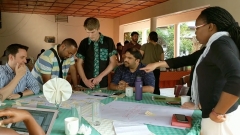DC Career Week Goes Virtual and Continues to Inspire Students
| by Jason Warburg
Many of our graduates launch successful careers in the nation’s capital. This year our DC Career Week went virtual and continued to be a catalyst for our students as they made meaningful connections with employers and gained invaluable advice from professionals working in fields like international development, global security, trade, and localization.


